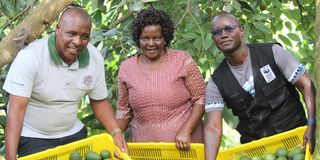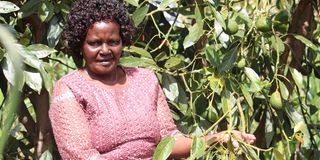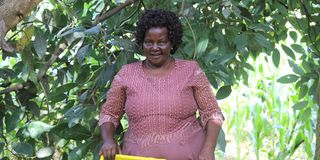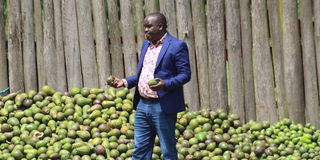Premium
Green gold: Bomet farmers dump maize for avocado

Paul Rono (left), a cooperative officer in Bomet County, avocado farmer Grace Mutai and Baca Ogalo, an agroecologist officer with the World Wide Fund for Nature (WWF) during harvesting and training of avocado farmers at Ms Mutai's farm in Aonet village, Bomet County, on April 19, 2025.
Ms Grace Mutai was a successful maize farmer in Bomet County until she stumbled on avocado farming, an enterprise she ventured into by accident. And the transformation has improved her fortunes.
A resident of Aonet village, Ms Mutai had for several years leased land across the county for maize cultivation.
But now, she is among a growing number of farmers in Bomet who have diversified their agricultural ventures and are now earning enough from avocados to meet financial needs, improve household nutrition and mitigate the effects of climate change.
“My entry into avocado farming was more of an accident. I overheard people discussing its potential in this region so I decided to try it. I bought four seedlings and planted them just to see what would happen. I haven’t looked back since then,” Ms Mutai said in an interview.

Ms Grace Mutai in her avocado farm in Aonet village in Mugango, Bomet County on April, 19, 2025.
She initially faced setbacks due to lack of proper agronomic knowledge.
Of the four seedlings she planted in 2020, only two survived to maturity.
Instead of giving up, she sourced 10 more seedlings, this time from a certified nursery supported by the World Wide Fund for Nature (WWF) in Mulot, Narok County.
All of them survived.
“It was encouraging to see them thrive. That gave me the motivation to expand,” she said.
It took three years for the trees to mature and when they finally bore fruit, she sold her harvest for Sh9,000 to a hawker, who paid her on the spot without weighing the produce.
“It’s been a steep learning curve. I didn’t know at the time that the fruits needed to be harvested in a specific way, graded and weighed,” she admitted.
In another instance, a dealer took her entire season’s harvest only to later inform her that the fruits had been rejected by exporters and were suitable only for oil extraction. She was paid Sh11,000, far below the Sh50,000 she had expected.

Ms Grace Mutai with freshly harvested and graded avocado at her farm in Aonet village, Bomet County on April 19, 2025.
Despite these early stumbles, Ms Mutai has seen steady progress. The highest amount she has earned so far is Sh30,000 from a single harvest. With improved practices, she expects even higher returns.
“I now know about harvesting techniques, post-harvest handling, grading, and weighing. I’ve also joined a cooperative society, which offers better market access,” she said, standing beside a grove of over 100 avocado trees spread across her 1.25acre farm.
She is optimistic that the improved agronomic support and market linkages will help boost both her production and income.
“Compared to maize, avocado farming has fewer risks and better returns. Maize is labour intensive, costly to dry and store and the market is unpredictable. With avocados, there’s high demand locally and abroad. The crop is also easier to manage,” she explained.
Agricultural diversification in Bomet is aligned with the Kenya Climate Smart Agriculture Project which encourages farmers to adopt environmentally sustainable and nutrition-focused farming practices.

Mr Benard Siele with his freshly harvested avocado at Cheptangulge village in Sotik, Bomet County on April 18, 2025.
To support this, the county has distributed 200,000 Hass avocado seedlings under a subsidy programme. An additional 30,000 seedlings have been issued to farmers in Konoin constituency by the national government while another 50,000 were supplied through FLoCA.
Bomet County Agriculture Chief Officer Dr Kibet Sitienei said the county government is collaborating with the World Bank-funded Financing Locally Led Climate Action (FLoCA) programme and WWF to expand avocado production in the region.
“Growing avocados, both commercially and for household use, supports conservation efforts and boosts local economies,” Dr Sitienei noted.
He said areas like Chemaner, Kembu and Merigi wards in Bomet East constituency and Boito in Konoin constituency are leading in avocado production. The crop has also created new job opportunities for local youth and women.
“In Bomet East, Biofarms Company has established an aggregation centre that exports the fruits. This has helped stabilise prices and eliminate brokers who previously exploited farmers,” said Dr Sitienei.
Mr Peter Muigai, the WWF Greater Mara Sub-Landscape Coordinator, said Bomet County has ideal conditions for avocado production and that the crop is becoming one of Kenya’s leading foreign exchange earners.
“Avocado farming supports environmental conservation, addresses nutrition challenges, and provides income. We’re working with local and national governments, communities and cooperatives to scale up the enterprise,” Mr Muigai said.
He noted that access to certified seedlings is essential for success and that the WWF is helping ensure farmers plant quality trees while also promoting conservation of rivers and water sources.
The push to increase avocado farming in Bomet aligns with President William Ruto’s national goal to plant 15 billion trees by 2032. Prof Barchok emphasised that the county will support farmers not just with seedlings, but also through technical assistance.
“Our agricultural officers are guiding farmers to plant seedlings correctly and apply best practices so they can grow them to maturity,” he said.
The broader diversification effort is expected to enhance food security and nutritional health in the county, which traditionally grows tea, maize, cabbages, potatoes and beans. More farmers are now reducing the land allocated to tea in favour of avocados which are increasingly being referred to as the region’s “green gold.”
Mr Simon Kimetto, the County Chief Officer for Water and Environment said the government is encouraging farmers to form Community-Based Organisations (CBOs) to better access the benefits of the avocado programme. These include training, markets and soil conservation support.
“Planting avocado trees slows down water runoff during the rainy season and allows more water to seep into the ground, preserving moisture necessary for high crop yields,” Mr Kimetto explained.
Kenya is currently the leading avocado exporter in Africa and ranked 10th globally having surpassed South Africa and Tanzania in 2021.
Director-General of the Agricultural and Food Authority (AFA), Dr Bruno Linyiru, said the international demand for Kenya’s Hass avocado is enormous.
“Our inspections ensure that pack houses meet international standards and that mature fruits are harvested consistently. We aim to avoid disruptions in the crop cycle and maintain quality exports,” Dr Linyiru said.
He noted that the Horticultural Crops Directorate (HCD), a unit under AFA, regulates avocado production and marketing under the Crops (Horticulture) Act, 2020.
In 2023, Kenya exported 123,000 tonnes of avocados, an increase from 103,000 tonnes in 2022. This 19 percent growth brought in Sh18 billion in foreign exchange.
Kenya’s major avocado export destinations include the Netherlands, Russia, China, Spain, Italy, France, Belgium and the United Kingdom. In the Middle East, Saudi Arabia, Qatar and the United Arab Emirates are key markets.
Murang’a County remains the leading avocado producer in Kenya accounting for 31 percent of national output. Other high-producing counties include Kiambu, Nakuru, Kisii, Nyamira, Meru and now, Bomet.





